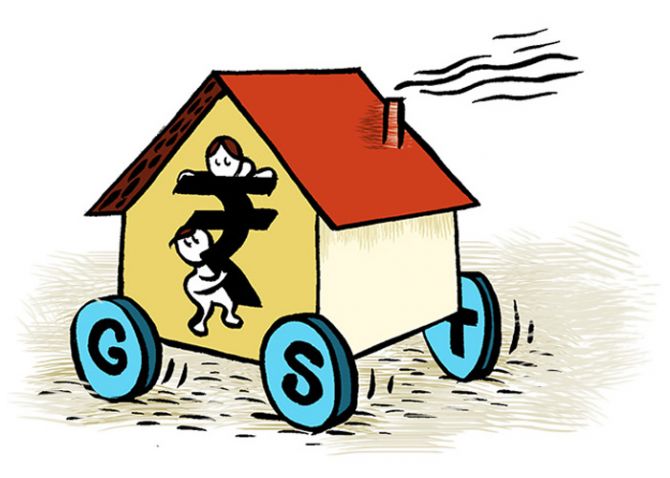Have companies overlooked the impact of GST on employee benefits such as health check-up facilities, mediclaim, mobile handsets, house lease, long service awards, employee welfare schemes, and so on, asks Anita Rastogi.
Illustration: Dominic Xavier/Rediff.com

A garment manufacturer rejects defective goods and then gives his employees a chance to pick them up at throwaway prices.
Many organisations offer laptops to employees to enable them to work on the go.
Should transactions such as these attract the goods and services tax (GST)?
So far, companies have analysed the impact of GST largely on their outward and inward supplies. Most are still grappling with the mammoth task of making themselves fully GST-compliant.
In the process, they may have overlooked the impact of GST on employee benefits such as health check-up facilities, mediclaim, mobile handsets, house lease, long service awards, employee welfare schemes, and so on.
Should employee benefits attract GST?
The first question that arises is whether employee benefits should attract GST at all.
Tax is to be levied on supplies of all goods and services made or agreed to be made for a consideration by a person in the course or furtherance of business.
Under the GST, employer and employee are considered as related parties. If the employer supplies something to the employee, and payment, albeit subsidised, is received by the former, such a transaction may attract GST.
If an employer gives a gift of value up to Rs 50,000 in a financial year to an employee, such gifts are specifically excluded from taxation. Hereafter, businesses will need to keep a record of the gifts they give to employees and their value.
Certain broad principles will have to be kept in mind while examining transactions between employer and employee. These are not defined under the GST but emerge largely from interpretation of various provisions of law.
Typically, any facility that is common to all employees (and not extended to only one identifiable employee/customer), such as free tea, coffee, etc, in an office may not attract GST.
Also, any facility provided for official usage by an employee in the normal course of employment, such as office laptop, parking, etc, may not be exigible (chargeable) to the GST.
However, any other supply by the employer that is not in the normal course of employment will have to be analysed on a case-by-case basis. Clearly, purchase of second-hand garments or of old laptops will be exigible for GST as there is supply of goods by the employer to the employee.
A plethora of transactions between employers and employees come to mind once one starts listing these: Club membership, data card reimbursements, cab facility, employee engagement, relocation benefits, recovery on account of loss of identification cards, and so on.
Each one will have to be scrutinised for whether they qualify as supply of goods and services. One might need to see the employment contracts and company human resource policies to figure the answers.
Arriving at right valuation
Interestingly, if the conclusion emerges that some transactions are indeed taxable, the next critical aspect to be looked at is the valuation of employee benefits.
Normally, GST is payable on the transaction value. But, transactions between related parties, such as employer and employee, attract the valuation rules.
The first principle that would apply is that if the open market value of such supply is available, then tax should be paid on such value. If the open market value is not available, the value of supply of goods or services of similar type and quality should be used.
If neither of the two is available, then the value should be taken as 110 per cent of the cost of production or manufacture, or cost of acquisition of such goods.
Finally, if this is also not available, the value should be determined using reasonable means, consistent with the principles and general provisions of valuation rules.
No doubt, valuing employee benefits appropriately will pose challenges. Hence, businesses need to do proper analyses of these issues, document these properly, and maintain those documents for the future.
Club membership and data card reimbursements might not trigger GST, as they might be considered as expenses for an official purpose. But, a subsidised cab facility or subsidised food subsidy would be charged to GST.
Valuation rules would need to be applied to these benefits to determine their correct value on which tax has to be paid.
Often, companies sell used laptops to employees at subsidised rates.
Company cars used by employees are sold to the latter at the end of four or five years at written-down values. Now, valuation rules will have to be applied to all such transactions and tax will have to be paid on the appropriate value that is determined.
Small business owners and start-ups will need to examine carefully each of their transactions with employees from the standpoint of GST.
Human resource policies will need to be scrutinised to ensure no transaction is missed. Clearly, if GST is paid, its impact will finally fall on employees, as employers will tend to pass on the burden to them. This might not be a very attractive proposition.
Tax planning will become all the more crucial in the future.
Considering that GST is such a mammoth transformational reform, and trade and industry are still inundated with GST issues, it would be ideal if the government were to go slow for the first six to 12 months.
In other words, if businesses have not paid tax on employee benefits that are considered as supply, no interest or penalty should be levied.
Just imagine the list of activities that needs to be looked at: Gym facilities, notice pay recovery, support towards corporate education, leave support, conferences, training, orientation programs, entertainment allowances, and so on.
Initially, the government's focus should be on taxing outward and inward supplies and it should go soft on transactions between employers and employees.
Anita Rastogi is partner–GST and indirect tax, PwC.











